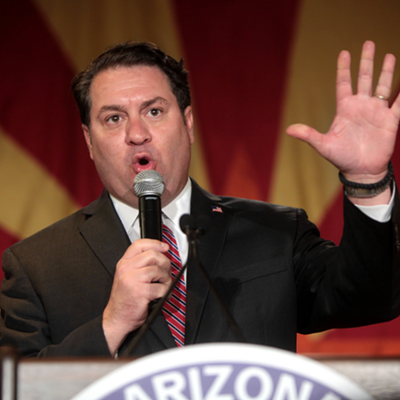RAILROADING COLLEEN MATHIS
By the time you peruse this edition of the Tucson Weekly, Gov. Jan Brewer and the Arizona Legislature may have already steamrolled over Independent Redistricting Commission chairwoman Colleen Mathis.
As of The Skinny's press deadline, Brewer was muscling Republicans in the Arizona Senate to support a push to impeach Mathis, who chairs the five-person panel—charged with drawing up political boundaries for members of Congress and the state Legislature—on trumped-up charges of "gross misconduct."
What is "gross misconduct" in the eyes of the Republicans who control the Arizona Legislature? Well, state Sen. Andy Biggs put it pretty plainly when he told Capitol Media Services' Howie Fischer: "Gross misconduct is essentially what the Legislature says gross misconduct is."
So ... if Biggs doesn't like the color of Mathis' shoes, he can declare that she has committed gross misconduct.
The charges against Mathis are flimsy, at best. Brewer and lawmakers are alleging, in a nutshell, that Mathis violated the state's open-meeting law, and that the draft maps produced for congressional and legislative boundaries are unconstitutional.
These are charges that would likely never stand up in court; in fact, Maricopa County Superior Court Dean Fink already told Attorney General Tom Horne last week that Horne had an ethical conflict in pursuing a similar investigation against Mathis, so that particular investigation has been turned over to Maricopa County Attorney Bill Montgomery.
Mary O'Grady, the attorney for the IRC, laid the groundwork for a legal challenge to the impeachment process in a letter to the governor earlier this week.
O'Grady said that Brewer—by writing a general letter outlining allegations last Wednesday, Oct. 26, and giving the commissioners until Monday, Oct. 31 to respond—failed to fulfill the constitutional requirements of an impeachment process.
O'Grady said that Brewer's letter "alleges no misconduct by any individual commissioner, fails to provide a reasonable time for responses, and improperly attempts to use the removal process to address issues that should be, and presently are being, resolved by the courts."
Brewer is clearly rushing the process, as are state lawmakers. Part of that may be related to public relations—giving the press less time to shine a light on this travesty will limit the subsequent political fallout—but it's more likely that Republicans want to act before the IRC can approve the maps and force a fight in the courts, rather than in the political arena of the Legislature.
Whether the courts will have a role in this remains to be seen—and the Arizona Senate isn't bound by the same rules that govern the courts. Instead, as Biggs told the press, they are bound simply by the limits of their power. Right now, the GOP has a supermajority in the Senate, so Republicans can do whatever the hell they want to do.
And if what they want to do is crucify Mathis, they can push forward with that plan. They can make up the rules as they go along; they can deny her due process; they can block her from even being able to defend herself. In short, they can make a mockery of justice, because they have the votes to do it.
Brewer and the Republican lawmakers are counting on the citizens of Arizona to roll over and let them get away with it, just as they've gotten away with cutting schools, taking health-care coverage from the poor, gutting university spending, weakening protections for clean air and clean water, stealing lottery dollars dedicated to parks and public transit, cutting taxes for corporations, and all the other moves they've made in the last year.
Sadly, they're probably right. The outrage will be loud for a few days or a few weeks. A few editorials will condemn their actions before all the sound and fury dies down, and lawmakers can go back to the business of dismantling state government and protecting GOP members of Congress.
Whether they can actually protect GOP incumbents remains to be seen—because it's also unclear how they're going to go about replacing Mathis if they're successful in knocking her off the commission.
The Arizona Constitution calls for any new members to come from the original pool of applicants, although convincing the current list of independents to step into the process this late—especially considering how the GOP has gone after the current IRC members—could prove challenging.
Time is running out to get a set of maps approved, given that the U.S. Department of Justice still needs to approve them, and local officials will still need to carve out precincts and take care of other legal minutiae before candidates can run for office in 2012.
At this point, Republicans probably figure they can reopen the application process to get someone more to their liking into the mix. As this impeachment gambit shows, Arizona's GOP leaders believe they can do anything they damn well please.
There's gross misconduct at work here, all right—but it's not on the part of the redistricting commissioners.
CLEAN WIN
Maricopa County Superior Court Judge Dean Fink has yanked a proposition that would kill Clean Elections off the 2012 ballot.
The legal issue revolves around how money now earmarked for political campaigns in the state and the city of Tucson would be spent in the future.
The prop, referred to the ballot by the Legislature earlier this year, was not a straight-up repeal of Clean Elections; instead, it would have amended the Arizona Constitution to prevent public funds from being spent on political campaigns, so it overruled the Clean Elections statute that provides funding to candidates.
Sam Wercinski, of the Arizona Advocacy Network Foundation, says the ruling was a big win for Clean Elections.
"As the Fiesta Bowl political corruption scandal continues to unravel, Arizona legislators have an opportunity to strengthen Clean Elections and government for the people, not corporations," Wercinski said in a press release last week.
The Skinny found that a bit odd, given that many of the lawmakers implicated in the Fiesta Bowl scandal—including Senate President Russell Pearce and Tucson Sen. Paula Aboud—were actually Clean Elections candidates.
Wercinski told The Skinny that the fact that many lawmakers still accepted gifts from the Fiesta Bowl even after running campaigns with public money shows that even Clean Elections candidates can end up corrupted by temptation.
"Once people use the system to get elected, they have to make the decision whether or not they want to utilize that shield that Clean Elections is, or whether they just want to jump into the system that's been at play for 90 years in Arizona," says Wercinski, who adds that the Fiesta Bowl scandal tells him that the Clean Elections law "needs to be strengthened."
Former state lawmaker Jonathan Paton, who pushed the referendum through the Legislature earlier this year, did not rule out an appeal of Fink's decision, but tells The Skinny that a more likely route would be pushing a new referendum that would pass legal muster.
"We'll be back," Paton says. "It's a relatively easy issue to fix."








